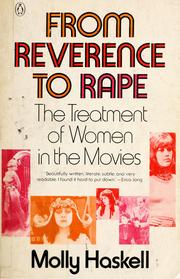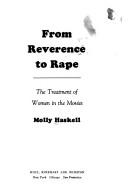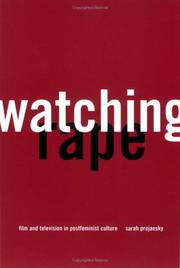| Listing 1 - 10 of 11 | << page >> |
Sort by
|
Book
ISBN: 9780226412894 022641289X 9780226412924 022641292X Year: 2016 Publisher: Chicago London The University of Chicago Press
Abstract | Keywords | Export | Availability | Bookmark
 Loading...
Loading...Choose an application
- Reference Manager
- EndNote
- RefWorks (Direct export to RefWorks)
"A revolutionary classic of feminist cinema criticism, Molly Haskell’s From Reverence to Rape remains as insightful, searing, and relevant as it was the day it was first published. Ranging across time and genres from the golden age of Hollywood to films of the late twentieth century, Haskell analyzes images of women in movies, the relationship between these images and the status of women in society, the stars who fit these images or defied them, and the attitudes of their directors. This new edition features both a new foreword by New York Times film critic Manohla Dargis and a new introduction from the author that discusses the book’s reception and the evolution of her views."--
Book
Abstract | Keywords | Export | Availability | Bookmark
 Loading...
Loading...Choose an application
- Reference Manager
- EndNote
- RefWorks (Direct export to RefWorks)
Victor J. Vitanza (author of Sexual Violence in Western Thought and Writing) continues to rethink the problem of sexual violence in cinema and how rape is often represented in "chaste" ways, in the form of a Chaste Cinematics. Vitanza continues to discuss Chaste Cinematics as participating in transdisciplinary-rhetorical traditions that establish the very foundations (groundings, points of stasis) for nation states and cultures. In this offering, however, the initial grounding for the discussions is "base materialism" (George Bataille): divine filth, the sacred and profane. It is this post-philosophical base materialism that destabilizes binaries, fixedness, and brings forth excluded thirds. Vitanza asks: why is it that a repressed third, or a third figure, returns, most strangely as a "product" of rape and torture? He works with Jean-Paul Sartre and Page duBois's suggestion that the "product" is a new "species." Always attempting unorthodox ways of approaching social problems, Vitanza organizes his table of contents as a DVD menu of "Extras" (supplements). This menu includes Alternate Endings and Easter Eggs as well as an Excursus, which invokes readers to take up the political exigency of the DVD-Book. Vitanza's first "Extra" studies a trio of films that need to be reconsidered, given what they offer as insights into Chaste Cinematics: Amadeus (a mad god), Henry Fool (a foolish god), and Multiple Maniacs (a divine god who is raped and eats excrement). The second examines Helke Sander's documentary Liberators Take Liberties, which re-thinks the rapes of German women by the Russians and Allies during the Battle of Berlin. The third rethinks Margie Strosser's video-film Rape Stories that calls for revenge. In the Alternate Endings, Vitanza rethinks the problem of reversibility in G. Noe's Irreversible. In the Easter Eggs, he considers Dominique Laporte's "the Irreparable," as the object of loss and Giorgio Agamben's "the Irreparable," as hope in what is without remedy. The result is not another film-studies book, but a new genre, a new set of rhetorics, for new ways of thinking about cinematics, perhaps postcinematics.
Motion pictures --- Rape in motion pictures --- Philosophy. --- History and criticism. --- rape --- film theory --- sexual violence --- rhetoric
Book
Abstract | Keywords | Export | Availability | Bookmark
 Loading...
Loading...Choose an application
- Reference Manager
- EndNote
- RefWorks (Direct export to RefWorks)
Victor J. Vitanza (author of Sexual Violence in Western Thought and Writing) continues to rethink the problem of sexual violence in cinema and how rape is often represented in "chaste" ways, in the form of a Chaste Cinematics. Vitanza continues to discuss Chaste Cinematics as participating in transdisciplinary-rhetorical traditions that establish the very foundations (groundings, points of stasis) for nation states and cultures. In this offering, however, the initial grounding for the discussions is "base materialism" (George Bataille): divine filth, the sacred and profane. It is this post-philosophical base materialism that destabilizes binaries, fixedness, and brings forth excluded thirds. Vitanza asks: why is it that a repressed third, or a third figure, returns, most strangely as a "product" of rape and torture? He works with Jean-Paul Sartre and Page duBois's suggestion that the "product" is a new "species." Always attempting unorthodox ways of approaching social problems, Vitanza organizes his table of contents as a DVD menu of "Extras" (supplements). This menu includes Alternate Endings and Easter Eggs as well as an Excursus, which invokes readers to take up the political exigency of the DVD-Book. Vitanza's first "Extra" studies a trio of films that need to be reconsidered, given what they offer as insights into Chaste Cinematics: Amadeus (a mad god), Henry Fool (a foolish god), and Multiple Maniacs (a divine god who is raped and eats excrement). The second examines Helke Sander's documentary Liberators Take Liberties, which re-thinks the rapes of German women by the Russians and Allies during the Battle of Berlin. The third rethinks Margie Strosser's video-film Rape Stories that calls for revenge. In the Alternate Endings, Vitanza rethinks the problem of reversibility in G. Noe's Irreversible. In the Easter Eggs, he considers Dominique Laporte's "the Irreparable," as the object of loss and Giorgio Agamben's "the Irreparable," as hope in what is without remedy. The result is not another film-studies book, but a new genre, a new set of rhetorics, for new ways of thinking about cinematics, perhaps postcinematics.
Motion pictures --- Rape in motion pictures --- Philosophy. --- History and criticism. --- rape --- film theory --- sexual violence --- rhetoric

ISBN: 0140039465 9780140039467 Year: 1974 Publisher: Harmondsworth Penguin
Abstract | Keywords | Export | Availability | Bookmark
 Loading...
Loading...Choose an application
- Reference Manager
- EndNote
- RefWorks (Direct export to RefWorks)
Sociology of the family. Sociology of sexuality --- Film --- History --- Women in motion pictures --- Rape in motion pictures --- CDL --- 791.43 --- Motion pictures --- Movies --- Images of women --- Book
Book
Abstract | Keywords | Export | Availability | Bookmark
 Loading...
Loading...Choose an application
- Reference Manager
- EndNote
- RefWorks (Direct export to RefWorks)
Victor J. Vitanza (author of Sexual Violence in Western Thought and Writing) continues to rethink the problem of sexual violence in cinema and how rape is often represented in "chaste" ways, in the form of a Chaste Cinematics. Vitanza continues to discuss Chaste Cinematics as participating in transdisciplinary-rhetorical traditions that establish the very foundations (groundings, points of stasis) for nation states and cultures. In this offering, however, the initial grounding for the discussions is "base materialism" (George Bataille): divine filth, the sacred and profane. It is this post-philosophical base materialism that destabilizes binaries, fixedness, and brings forth excluded thirds. Vitanza asks: why is it that a repressed third, or a third figure, returns, most strangely as a "product" of rape and torture? He works with Jean-Paul Sartre and Page duBois's suggestion that the "product" is a new "species." Always attempting unorthodox ways of approaching social problems, Vitanza organizes his table of contents as a DVD menu of "Extras" (supplements). This menu includes Alternate Endings and Easter Eggs as well as an Excursus, which invokes readers to take up the political exigency of the DVD-Book. Vitanza's first "Extra" studies a trio of films that need to be reconsidered, given what they offer as insights into Chaste Cinematics: Amadeus (a mad god), Henry Fool (a foolish god), and Multiple Maniacs (a divine god who is raped and eats excrement). The second examines Helke Sander's documentary Liberators Take Liberties, which re-thinks the rapes of German women by the Russians and Allies during the Battle of Berlin. The third rethinks Margie Strosser's video-film Rape Stories that calls for revenge. In the Alternate Endings, Vitanza rethinks the problem of reversibility in G. Noe's Irreversible. In the Easter Eggs, he considers Dominique Laporte's "the Irreparable," as the object of loss and Giorgio Agamben's "the Irreparable," as hope in what is without remedy. The result is not another film-studies book, but a new genre, a new set of rhetorics, for new ways of thinking about cinematics, perhaps postcinematics.
Motion pictures --- Rape in motion pictures --- rape --- film theory --- sexual violence --- rhetoric --- Philosophy. --- History and criticism. --- rape --- film theory --- sexual violence --- rhetoric

ISBN: 0030076064 Year: 1974 Publisher: New York (N.Y.) Holt, Rinehart and Winston
Abstract | Keywords | Export | Availability | Bookmark
 Loading...
Loading...Choose an application
- Reference Manager
- EndNote
- RefWorks (Direct export to RefWorks)
791.43.04 --- Rape in motion pictures --- Women in motion pictures --- #SBIB:309H1328 --- Motion pictures --- 791.43.04 Iconologie, iconografie van de film. Filmthema's --- Iconologie, iconografie van de film. Filmthema's --- Films met een ideologische en spiegelfunctie --- Rape in motion pictures. --- Women in motion pictures.
Book
ISBN: 9781438487601 9781438487595 Year: 2022 Publisher: Albany : SUNY Press,
Abstract | Keywords | Export | Availability | Bookmark
 Loading...
Loading...Choose an application
- Reference Manager
- EndNote
- RefWorks (Direct export to RefWorks)
"Considers how Hollywood films since the 1960s have both reflected and shaped attitudes toward rape and sexual violence. Screening #MeToo offers an important and timely discussion of the pervasive nature of rape culture in Hollywood. Essays in the collection examine films released from the 1960s onward, a broad period that coincides with the end of the Motion Picture Production Code in Hollywood, which resulted in more frequent and increasingly graphic images of sex and violence being included in mainstream movies. Focusing on narratives in which surveillance and sexual violence feature prominently, contributors from North America and Europe examine a variety of film genres, including spy films, teen comedies, kitchen sink dramas, coming-of-age stories, rape/revenge films, and horror films. Reflecting the increasing social and academic awareness of sexual violence in Hollywood film and its transmission and cultivation of rape culture in the United States and abroad, they are concerned not only with the content of the films under scrutiny but also with the clear relationship between the stories, how they are being told, and the culture that produced them. Screening #MeToo challenges readers to look at mainstream Hollywood films differently, in light of attitudes about art and power, sexuality and consent, and the pleasures and frustrations of criticizing "entertainment" films from these perspectives." --
Rape in motion pictures. --- Motion picture industry --- Sex crimes --- MeToo movement. --- Women in motion pictures. --- Women --- Motion pictures --- MeToo movement --- Social aspects --- History. --- Crimes against --- In motion pictures. --- Public opinion. --- California
Book
ISBN: 9780813566030 0813566037 9780813566023 0813566029 1306694264 0813566045 Year: 2014 Publisher: New Brunswick, New Jersey Rutgers University Press,
Abstract | Keywords | Export | Availability | Bookmark
 Loading...
Loading...Choose an application
- Reference Manager
- EndNote
- RefWorks (Direct export to RefWorks)
Winner of the 2016 Nonfiction Category from The Authors' Zone In recent years, members of legal, law enforcement, media and academic circles have portrayed rape as a special kind of crime distinct from other forms of violence. In Framing the Rape Victim, Carine M. Mardorossian argues that this differential treatment of rape has exacerbated the ghettoizing of sexual violence along gendered lines and has repeatedly led to women's being accused of triggering, if not causing, rape through immodest behavior, comportment, passivity, or weakness. Contesting the notion that rape is the result of deviant behaviors of victims or perpetrators, Mardorossian argues that rape saturates our culture and defines masculinity's relation to femininity, both of which are structural positions rather than biologically derived ones. Using diverse examples throughout, Mardorossian draws from Hollywood film and popular culture to contemporary women's fiction and hospitalized birth emphasizing that the position of dominant masculinity can be occupied by men, women, or institutions, while structural femininity is a position that may define and subordinate men, minorities, and other marginalized groups just as effectively as it does women. Highlighting the legacies of the politically correct debates of the 1990's and the terrorist attacks of 9/11, the book illustrates how the framing of the term "victim" has played a fundamental role in constructing notions of agency that valorize autonomy and support exclusionary, especially masculine, models of American selfhood. The gendering of rape, including by well-meaning, sometimes feminist, voices that claim to have victims' best interests at heart, ultimately obscures its true role in our culture. Both a critical analysis and a call to action, Framing the Rape Victim shows that rape is not a special interest issue that pertains just to women but a pervasive one that affects our society as a whole.
Rape victims --- Rape --- Women --- Rape in motion pictures. --- #SBIB:343.9H0 --- #SBIB:316.346H25 --- #SBIB:39A11 --- Motion pictures --- Human females --- Wimmin --- Woman --- Womon --- Womyn --- Females --- Human beings --- Femininity --- Female rape victims --- Sexual abuse victims --- Violence against --- Criminologie --- Positie van de vrouw in de samenleving: delinquentie --- Antropologie : socio-politieke structuren en relaties --- Rape in motion pictures --- Rape victims - United States --- Rape - United States --- Women - Violence against - United States

ISBN: 0814766900 0814766897 0814768717 Year: 2001 Publisher: New York New York University Press
Abstract | Keywords | Export | Availability | Bookmark
 Loading...
Loading...Choose an application
- Reference Manager
- EndNote
- RefWorks (Direct export to RefWorks)
Looking at popular culture from 1980 to the present, feminism appears to be ""over"": that is, according to popular critics we are in an era of ""postfeminism"" in which feminism has supposedly already achieved equality for women. Not so, says Sarah Projansky. In Watching Rape , Projansky undermines this complacent view in her fascinating and thorough analysis of depictions of rape in U.S. film, television, and independent video. Through a cultural studies analysis of such films as Thelma and Louise , Daughters of the Dust , and She's Gotta Have It , and television shows like ER , Ally McBeal
Culture in motion pictures. --- Rape in motion pictures. --- Women in motion pictures. --- Women on television. --- History --- Criminology. Victimology --- Sociology of culture --- Film --- Community organization --- Sociology of the family. Sociology of sexuality --- Mass communications --- Women in television --- Women in television plays --- Television --- Motion pictures --- Feminism --- Movie review --- Movies --- Popular culture --- Feminist currents --- Rape --- Images of women --- Book
Book
ISBN: 1283192934 1443830771 9786613192936 9781443830775 144382898X 9781443828987 Year: 2011 Publisher: Newcastle Cambridge Scholars
Abstract | Keywords | Export | Availability | Bookmark
 Loading...
Loading...Choose an application
- Reference Manager
- EndNote
- RefWorks (Direct export to RefWorks)
"A Zoo of Lusts . . . A Harem of Fondled Hatred": An Historical Interrogation of Sexual Violence against Women in Film explores the pernicious nature of rape in films from the silent era to the 21st century. Film is an excellent medium through which to hold this discussion, because film, like the body, as Judith Butler, et al. suggest, is fluid and indeterminate, and it is often contemplated as a site for negotiation and resistance. This book addresses three major questions: (1) why does rape...
Rape in motion pictures. --- Women in motion pictures. --- Rape --- Assault, Criminal (Rape) --- Assault, Sexual --- Criminal assault (Rape) --- Nonconsensual sexual intercourse --- Sexual assault --- Offenses against the person --- Sex crimes --- Motion pictures --- Social aspects. --- Forced sexual intercourse --- Forced sexual penetration --- Penetration, Forced sexual --- Sexual intercourse, Forced --- Sexual intercourse, Nonconsensual --- Sexual penetration, Forced
| Listing 1 - 10 of 11 | << page >> |
Sort by
|

 Search
Search Feedback
Feedback About
About Help
Help News
News